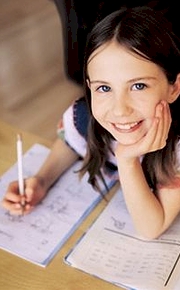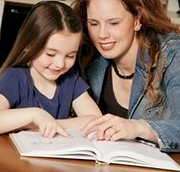|
 |
School At Home
La Escuela En Casa |
|
All
children in the United States have to receive an education, but the law does
not say they have to be educated at school. |
 |
|
A number of parents prefer not to
send their children to school. Children who are educated at home are known
as"home-schoolers." There are about 300.000 home-schoolers in the United
States today. Some parents prefer teaching their children at home because they
do not believe that public schools teach the correct religious values; others
believe they can provide a better educational experience for their children by
teaching them at home. Interestingly, results show that home-schooled children
quite often do better than average on national tests in reading and math. |
| |
|
 |
|
David
Guterson and his wife teach their three children at home. Guterson says that
his children learn very differently from children in school. Learning starts
with the children's interests and questions. For example, when there is heavy
snowfall on a winter day, it may start a discussion or reading about climate,
snow removal equipment, Alaska, polar bears, and winter tourism. Or a spring
evening when the family is out watching the stars is a good time to ask
questions about satellites and the space program. If the Brazilian rain
forests are on the TV news, it could be a perfect time to talk about how rain
forests influence the climate, how deserts are formed, and how the polar ice
caps affect ocean levels. |
| |
|
 |
|
Home schooling is often more interesting than regular schools, but critics
say that home-schoolers are outsiders who might be uncomfortable mixing with
other people in adult life. Critics also say that most parents are not well
qualified to teach their children. However, most parents don't have the time
or the desire to teach their children at home, so schools will continue to be
where most children get their formal education. |
|
VOCABULARY
|
|
 |
|
home-schooling:
escolaridad doméstica;
to home-school:
educar/se en el hogar;
home-schooler:
estudiante doméstico;
public-schooler:
estudiante de escuela pública |
|
religious values: valores morales religiosos;
quite often: muy a menudo; do better than average: superan el promedio;
heavy snowfall: nevada intensa; removal: eliminación; rain forests: selvas tropicales;
ice caps: capas o estratos de hielo; outsiders: desconocidos, extraños;
well qualified: bien preparados o calificados;
will continue to be: seguirán siendo |
|
 |
Activity 10: Basándote en
el texto anterior selecciona las respuestas más
adecuadas. Verifica luego las
respuestas correctas.
|
 |
|

|
¡¡ FELICITACIONES
!! Has finalizado la
LECCION 1
del curso Avanzado conversacional.
Antes de pasar a la siguiente lección, por favor asegúrate de
repasar todo lo que has aprendido aquí. |
|